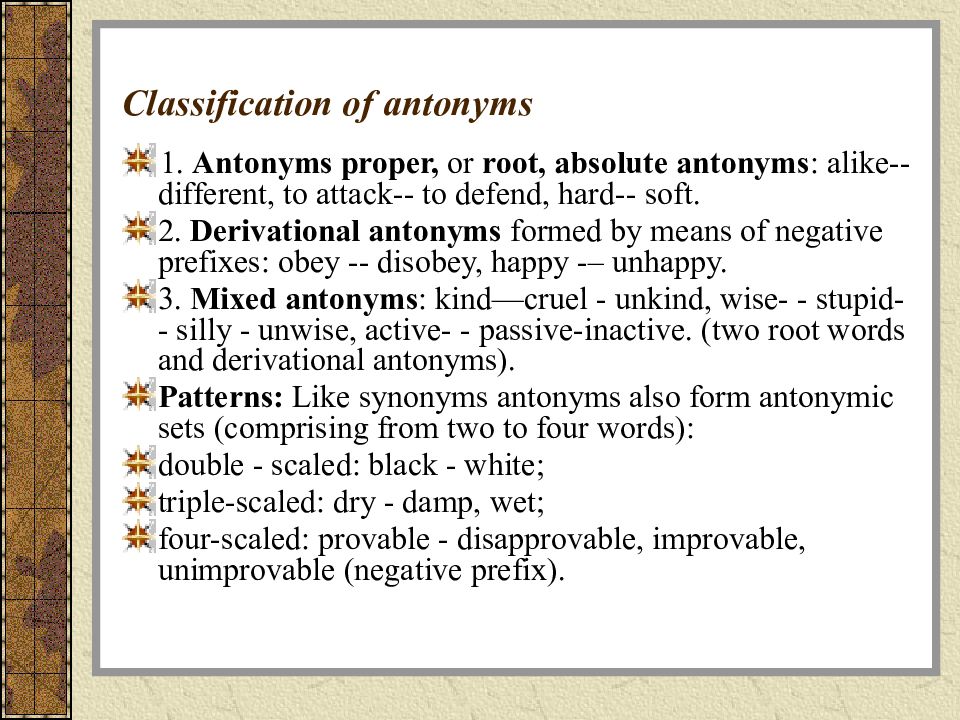Скачать материал
без ожидания

Скачать материал
без ожидания


- Сейчас обучается 244 человека из 56 регионов


- Сейчас обучается 71 человек из 36 регионов


- Сейчас обучается 49 человек из 23 регионов


Описание презентации по отдельным слайдам:
-
1 слайд
Синонимы в английском языке
-
2 слайд
Определение синонимов
Синонимы — это слова, которые различаются по звучанию и написанию, но очень близки по лексическому значению, то есть по смыслу. -
3 слайд
Классификации синонимов
По степени эквивалентности (синонимичности) синонимы делятся на
полные (абсолютные);
частичные (относительные).
Абсолютные синонимы, полностью совпадающие по значению, встречаются чрезвычайно редко, в основном в сфере научной терминологии. Примеры: semasiology — semantics, fatherland – motherland, allow – permit.
Примеры относительных синонимов: big – large, ask – beg – implore, like – love – adore, gift – talent.
Выделяется также отдельная группа контекстных (контекстуальных) синонимов, у которых значение совпадает в определенной дистрибуции. Например, глаголы buy и get в следующих предложениях являются синонимами: I’ll go to the shop and buy some bread. I’ll go to the shop and get some bread. -
4 слайд
Классификация по типу коннотативных значений
1.указание на степень интенсивности признака (to like — to admire — to love — to adore — to worship)
2. указание на длительность процесса (to flash — to blaze, to say — to talk)
3. эмотивное значение (to stare — to glare — to gaze)
4. оценочное значение (well-known — famous — notorious — celebrated)
5. значение причины (to shiver — to shudder)
6. указание на манеру действия (to stroll — to stride — to trot)
6. указание на сопутствующие обстоятельства (to peep — to peer)
7. стилистические коннотации( to leave(neutral) — to be off, to clear out— to beat it, to hoof it, to take the air (sl.) — to depart, to retire, to withdraw (formal)). -
5 слайд
Для чего нужны синонимы?
Оттенки смысла
Во-первых, английские синонимы передают разные оттенки смысла и разный накал эмоций. Аналоги слов обогащают язык, оживляют и разнообразят речь. С их помощью разбавляется однообразие изложения и повторение одних и тех же лексем. -
6 слайд
Как заменить лексему синонимом
лексему amazing (удивительный) в английском языке можно заменить огромным числом слов: incredible -невероятный
fabulous-неправдоподобный
wonderful -замечательный
Fantastic- фантастический
astonishing -поразительный
extraordinary -необычайный -
7 слайд
Синонимы к слову bad:
•Unfriendly — враждебный
•Evil — злой
•Unfavorable — неблагоприятный
•Rotten — испорченный
•Immoral — безнравственный
•Sinful — ужасный
•Wicked — злобный
•Depraved — развращенный
•Spoiled — избалованный
•Harmful — пагубный
•Defective — дефектный
•Horrible — жуткий -
8 слайд
Синонимы к слову dull:
•Boring — надоедливый
•Stupid — глупый
•Monotonous — монотонный
•Tiring — изнурительный
•Dumb — молчаливый
•Slow — медленный
•Insensible — безразличный
•Tedious — нудный
•Dreary — унылый
•Listless — апатичный
•Tiresome-утомительный -
9 слайд
Синонимы к слову look:
•Watch — наблюдать
•Gaze-вглядываться
•Study — изучать
•Survey — осматривать
•Stare — уставиться
•Spy — шпионить
•Glance — взглянуть, бросить взгляд
•Peek — заглядывать
•Peep — проглядывать, беглый взгляд
•See-видеть
•Look-взглянуть
•Discover — обнаруживать
•Sight — заметить, высмотреть
•Scrutinize — пристально разглядывать
•View-обозревать -
10 слайд
Стиль и беглоcть речи.
(избегайте повторов)
Здоровый образ жизни очень важен,
ведь здоровье – самое важное, что у нас есть. Чтобы оставаться здоровым, важно правильно питаться и заниматься физкультурой. При этом важно, чтобы
питание было здоровым, а упражнения – регулярными.
Healthy lifestyle is very important
because health is the most important thing
we have. To stay healthy, it’s important to eat right and do exercises. It’s also important to make sure you eat healthily and exercise regularly. -
11 слайд
Замена синонимами
It is necessary to keep fit because our physical state
is the main thing. To stay healthy it is vital to eat right
and do exercises. You also need to make sure you eat
useful food and go in for sport regularly.Healthy lifestyle is very important
because health is the most important thing
we have. To stay healthy, it’s important to eat right and do exercises. It’s also important to make sure you eat healthily and exercise regularly. -
12 слайд
Успешно сдать экзамен, зная синонимы
использование синонимов в заданиях ОГЭ и ЕГЭ, очень актуально, например, при написании эссе или письма. Знание близких по значению слов, очень важно, именно потому, что необходимо показать, что учащийся владеет лексикой. Кроме того, необходимо избегать повторов одних и тех же фраз и выражений. -
13 слайд
Наиболее употребляемые слова и их синонимы
-
14 слайд
Прилагательные и их синонимы
Essential-vital-key-substantial -существенный-жизненно важный-основной-значительный
Awful — dreadful, terrible, horrible — ужасный, отвратительный, страшный
Angry — mad, furious, exasperated — злой, раздраженный, взбешенный
Brave — courageous, fearless, heroic, valiant — смелый, отважный, героический
Calm — quiet, peaceful, still — спокойный, тихий, мирный
Dull — boring, uninteresting, slow — скучный, утомительный, неинтересный
Happy — joyful, cheerful, glad, pleased — счастливый, довольный, веселый
Fine-excellent- wonderful -super-хороший-отличный-замечательный-превосходный
Краткое описание документа:
Презентация может быть использована при обучении по любому учебнику,так как в ней содержатся материалы,которые можно использовать для изучения синонимии в английском языке.Для подготовки к ЕГЭ будет полезно изучить наибольшее количество синонимом,так как на писание письменных работ требует знания синонимов английского языка.Знание синонимов и их правильное употребление сделает вашу речь более разнообразной яркой,лексически насыщенной и поможет избегать повторов при написании письменных работ на экзаменах.
Найдите материал к любому уроку, указав свой предмет (категорию), класс, учебник и тему:
6 238 098 материалов в базе
- Выберите категорию:
-
Выберите учебник и тему
- Выберите класс:
-
Тип материала:
-
Все материалы
-
Статьи
-
Научные работы
-
Видеоуроки
-
Презентации
-
Конспекты
-
Тесты
-
Рабочие программы
-
Другие методич. материалы
-
Найти материалы
Другие материалы

Рейтинг:
5 из 5
- 17.02.2019
- 2093
- 174


- 17.02.2019
- 1041
- 86



- 17.02.2019
- 188
- 2
- 17.02.2019
- 182
- 0
Вам будут интересны эти курсы:
-
Курс повышения квалификации «Организация научно-исследовательской работы студентов в соответствии с требованиями ФГОС»
-
Курс повышения квалификации «Специфика преподавания конституционного права с учетом реализации ФГОС»
-
Курс повышения квалификации «Управление финансами: как уйти от банкротства»
-
Курс повышения квалификации «Организация практики студентов в соответствии с требованиями ФГОС медицинских направлений подготовки»
-
Курс повышения квалификации «Правовое регулирование рекламной и PR-деятельности»
-
Курс профессиональной переподготовки «Теория и методика преподавания иностранных языков: английский, немецкий, французский»
-
Курс профессиональной переподготовки «Теория и методика преподавания иностранных языков в профессиональном образовании: английский, немецкий, французский»
-
Курс профессиональной переподготовки «Организация деятельности секретаря руководителя со знанием английского языка»
-
Курс профессиональной переподготовки «Корпоративная культура как фактор эффективности современной организации»
-
Курс профессиональной переподготовки «Методика организации, руководства и координации музейной деятельности»
Слайд 2Определение синонимов
Синонимы — это слова, которые различаются по звучанию и написанию,
но очень близки по лексическому значению, то есть по смыслу.
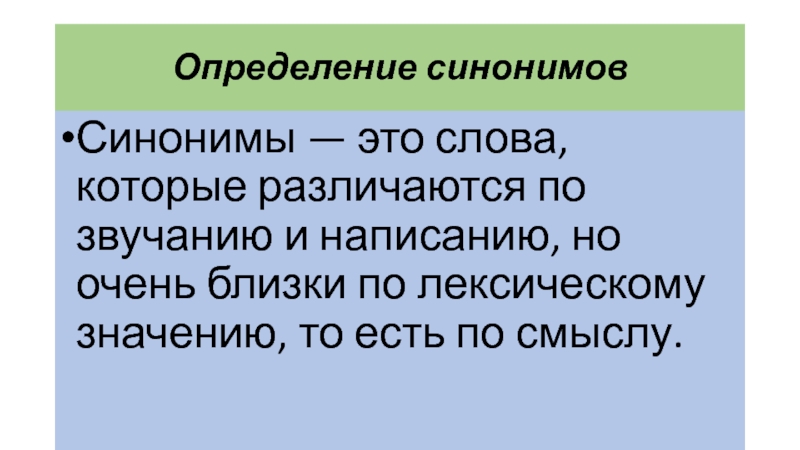
Слайд 3Классификации синонимов
По степени эквивалентности (синонимичности) синонимы делятся на
полные (абсолютные);
частичные (относительные).
Абсолютные синонимы,
полностью совпадающие по значению, встречаются чрезвычайно редко, в основном в сфере научной терминологии. Примеры: semasiology — semantics, fatherland – motherland, allow – permit.
Примеры относительных синонимов: big – large, ask – beg – implore, like – love – adore, gift – talent.
Выделяется также отдельная группа контекстных (контекстуальных) синонимов, у которых значение совпадает в определенной дистрибуции. Например, глаголы buy и get в следующих предложениях являются синонимами: I’ll go to the shop and buy some bread. I’ll go to the shop and get some bread.
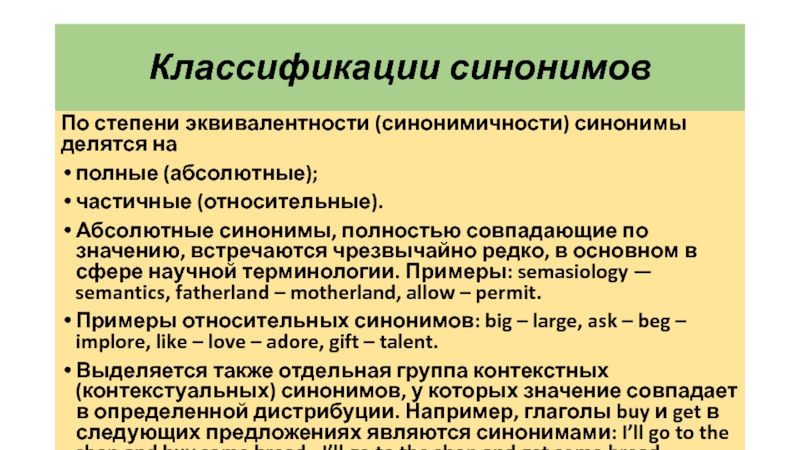
Слайд 4Классификация по типу коннотативных значений
1.указание на степень интенсивности признака (to like
— to admire — to love — to adore — to worship)
2. указание на длительность процесса (to flash — to blaze, to say — to talk)
3. эмотивное значение (to stare — to glare — to gaze)
4. оценочное значение (well-known — famous — notorious — celebrated)
5. значение причины (to shiver — to shudder)
6. указание на манеру действия (to stroll — to stride — to trot)
6. указание на сопутствующие обстоятельства (to peep — to peer)
7. стилистические коннотации( to leave(neutral) — to be off, to clear out— to beat it, to hoof it, to take the air (sl.) — to depart, to retire, to withdraw (formal)).
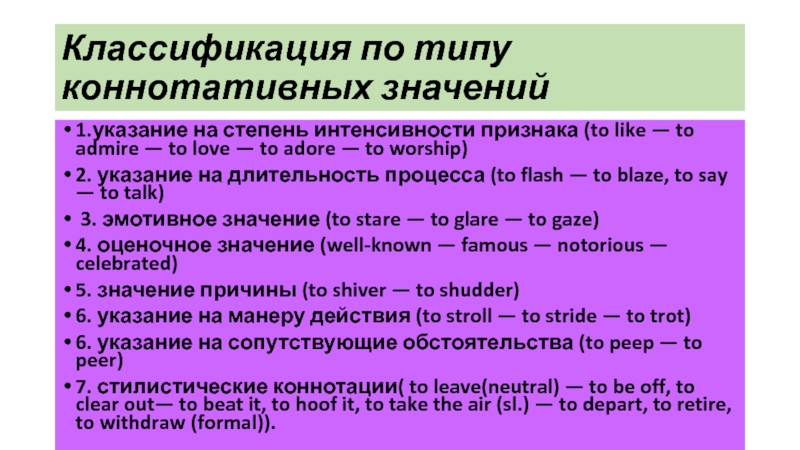
Слайд 5Для чего нужны синонимы?
Оттенки смысла
Во-первых, английские синонимы передают разные оттенки смысла
и разный накал эмоций. Аналоги слов обогащают язык, оживляют и разнообразят речь. С их помощью разбавляется однообразие изложения и повторение одних и тех же лексем.
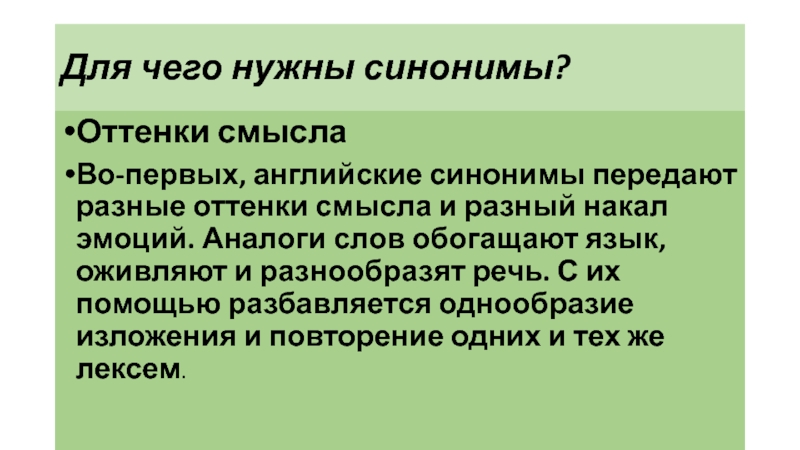
Слайд 6Как заменить лексему синонимом
лексему amazing (удивительный) в английском языке можно заменить
огромным числом слов: incredible -невероятный
fabulous-неправдоподобный
wonderful -замечательный
Fantastic- фантастический
astonishing -поразительный
extraordinary -необычайный
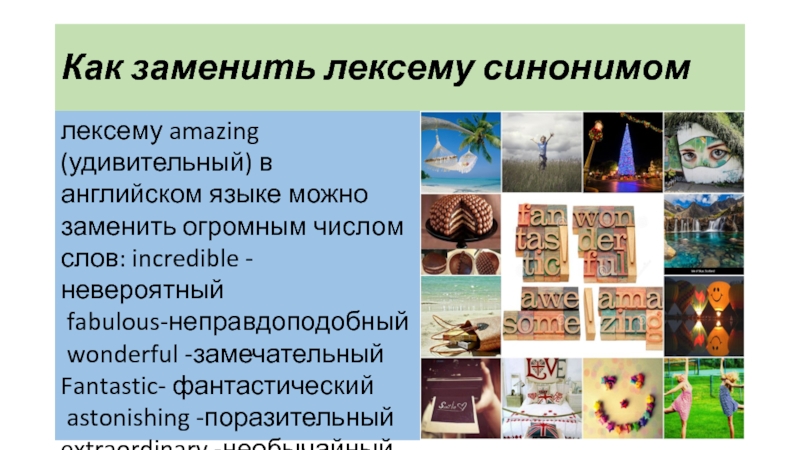
Слайд 7Синонимы к слову bad:
• Unfriendly — враждебный
• Evil — злой
• Unfavorable — неблагоприятный
• Rotten
— испорченный
• Immoral — безнравственный
• Sinful — ужасный
• Wicked — злобный
• Depraved — развращенный
• Spoiled — избалованный
• Harmful — пагубный
• Defective — дефектный
• Horrible — жуткий
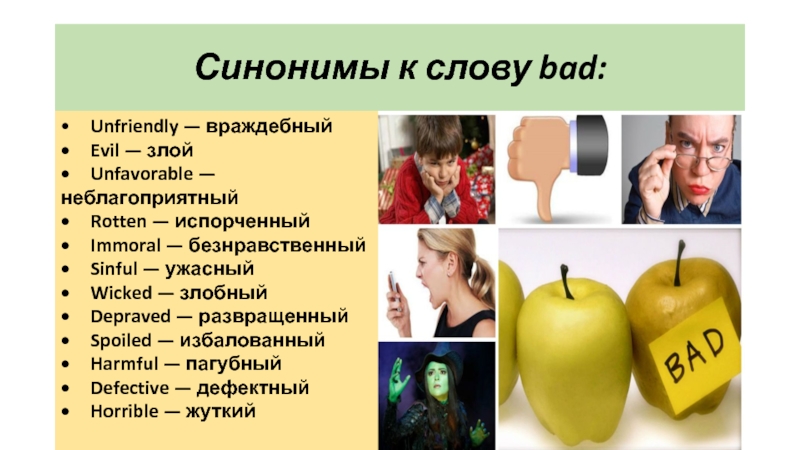
Слайд 8Синонимы к слову dull:
•Boring — надоедливый
•Stupid — глупый
•Monotonous — монотонный
•Tiring
— изнурительный
•Dumb — молчаливый
•Slow — медленный
•Insensible — безразличный
•Tedious — нудный
•Dreary — унылый
•Listless — апатичный
•Tiresome-утомительный
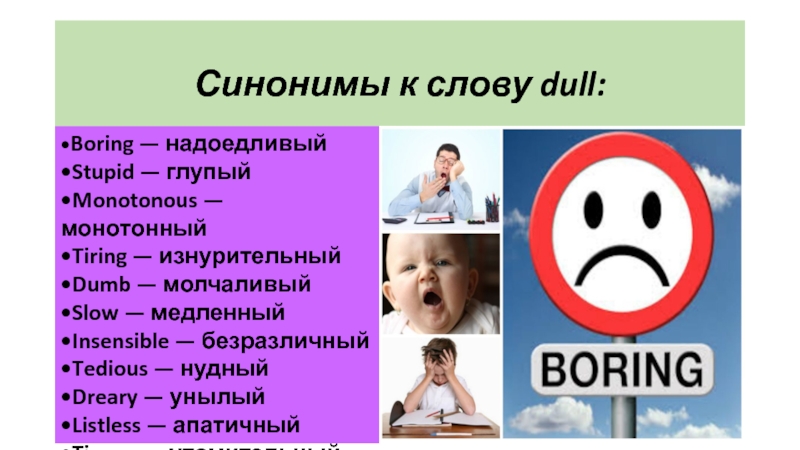
Слайд 9Синонимы к слову look:
• Watch — наблюдать
• Gaze-вглядываться
• Study — изучать
• Survey — осматривать
• Stare
— уставиться
• Spy — шпионить
• Glance — взглянуть, бросить взгляд
• Peek — заглядывать
• Peep — проглядывать, беглый взгляд
• See-видеть
• Look-взглянуть
• Discover — обнаруживать
• Sight — заметить, высмотреть
• Scrutinize — пристально разглядывать
• View-обозревать
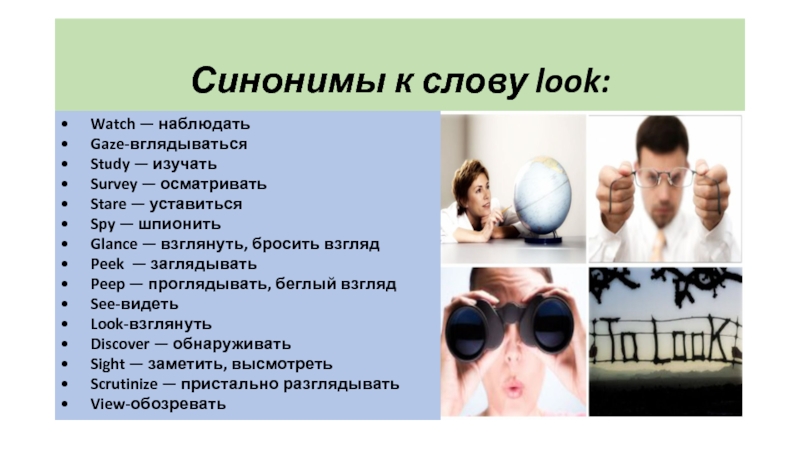
Слайд 10Стиль и беглоcть речи.
(избегайте повторов)
Здоровый образ жизни очень важен,
ведь здоровье
– самое важное, что у нас есть. Чтобы оставаться здоровым, важно правильно питаться и заниматься физкультурой. При этом важно, чтобы
питание было здоровым, а упражнения – регулярными.
Healthy lifestyle is very important
because health is the most important thing
we have. To stay healthy, it’s important to eat right and do exercises. It’s also important to make sure you eat healthily and exercise regularly.
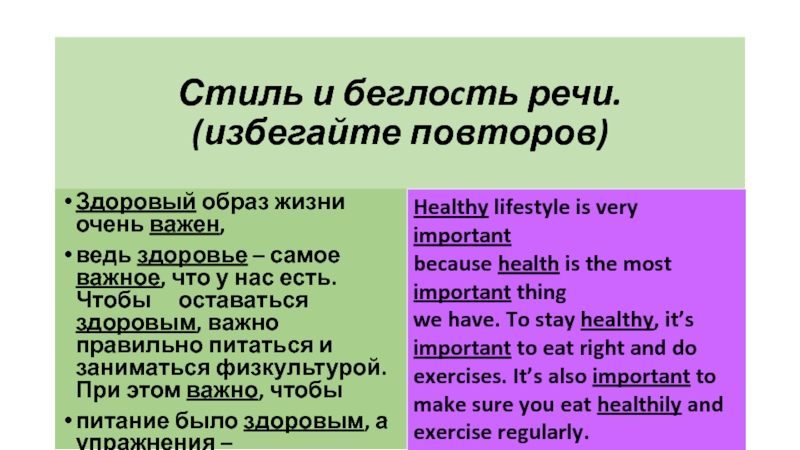
Слайд 11Замена синонимами
It is necessary to keep fit because our physical state
is
the main thing. To stay healthy it is vital to eat right
and do exercises. You also need to make sure you eat
useful food and go in for sport regularly.
Healthy lifestyle is very important
because health is the most important thing
we have. To stay healthy, it’s important to eat right and do exercises. It’s also important to make sure you eat healthily and exercise regularly.
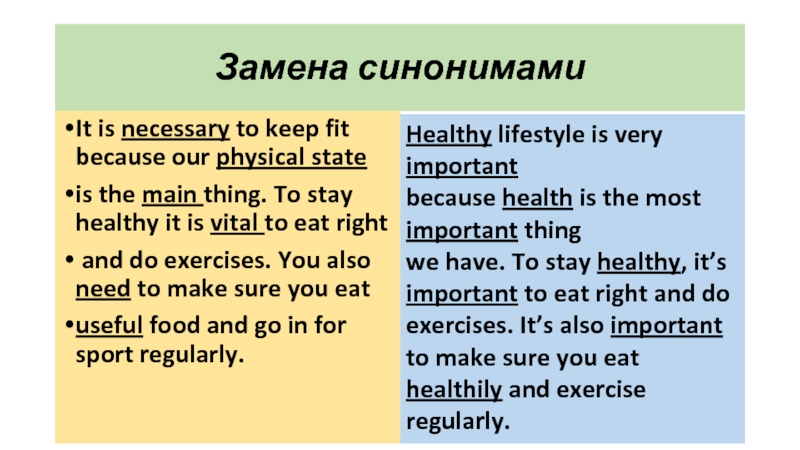
Слайд 12Успешно сдать экзамен, зная синонимы
использование синонимов в заданиях ОГЭ и ЕГЭ,
очень актуально, например, при написании эссе или письма. Знание близких по значению слов, очень важно, именно потому, что необходимо показать, что учащийся владеет лексикой. Кроме того, необходимо избегать повторов одних и тех же фраз и выражений.
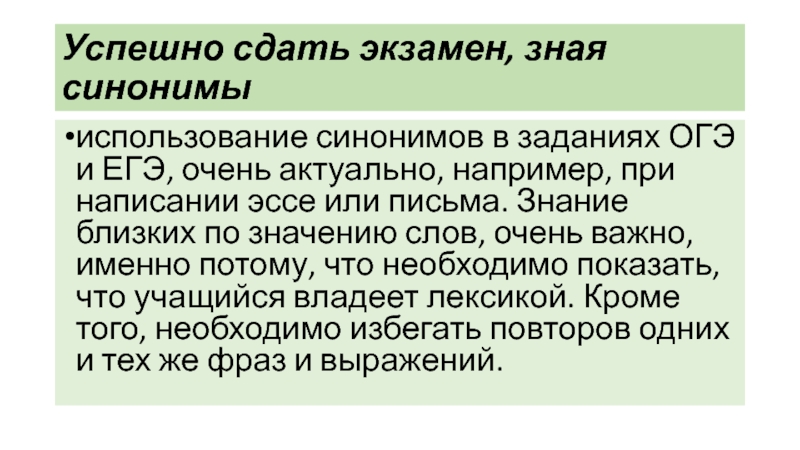
Слайд 13Наиболее употребляемые слова и их синонимы
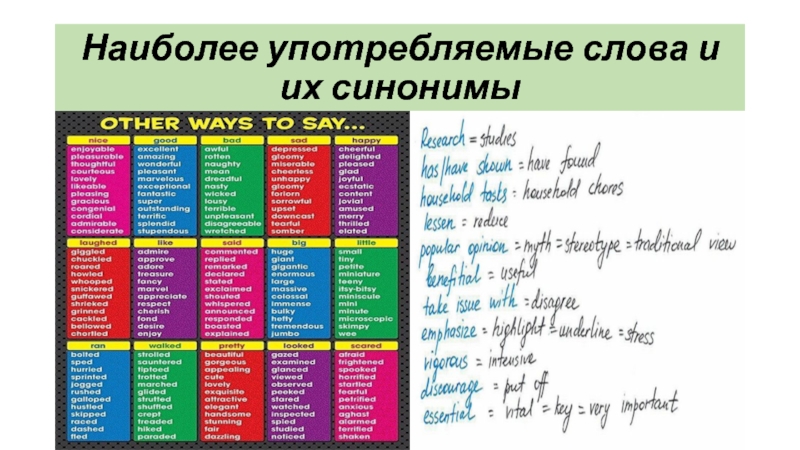
Слайд 14Прилагательные и их синонимы
Essential-vital-key-substantial -существенный-жизненно важный-основной-значительный
Awful — dreadful, terrible, horrible —
ужасный, отвратительный, страшный
Angry — mad, furious, exasperated — злой, раздраженный, взбешенный
Brave — courageous, fearless, heroic, valiant — смелый, отважный, героический
Calm — quiet, peaceful, still — спокойный, тихий, мирный
Dull — boring, uninteresting, slow — скучный, утомительный, неинтересный
Happy — joyful, cheerful, glad, pleased — счастливый, довольный, веселый
Fine-excellent- wonderful -super-хороший-отличный-замечательный-превосходный
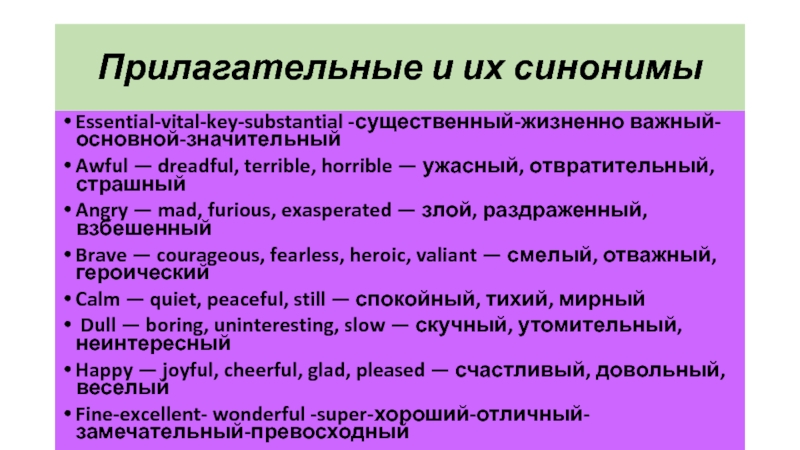
classification of synonyms
Изображение слайда
2
Слайд 2: Definition and classification of synonyms
Synonym is one of two or more words having approximately the same meaning, e. g. sad -unhappy, kid — child — infant, large — big, to tell – to relate, little – small.
relationships of synonymous words
criteria of synonymy
Изображение слайда
Criterion:
words of the same category of parts of speech conveying the same notion but different in shades of meaning or in stylistic characteristics.
semantic criterion:
the same denotational component but differing in connotations or in connotative components.
Изображение слайда
4
Слайд 4: Classification
Synonyms are traditionally classified into ideographic, ideographic-stylistic and absolute.
Изображение слайда
5
Слайд 5: Ideographic synonyms are words having the same notion but differing in the shades of meaning:
“to stare — to gaze — to glance — to peer”, “to eat — to take food; to partake — to take food in company with others; to peck — to take food in small quantities, bit by bit; to wolf — to eat greedily, voraciously”. Ideographic synonyms differ in additional implications which constitute the semantic components of the denotational meaning.
Изображение слайда
6
Слайд 6: Ideographic-stylistic or stylistic synonyms
are words denoting the same thing, having the same denotational meaning, but differing in stylistic connotation: daddy (colloquial), father (neutral), parent (literary); go on (col. ), continue (neutral), proceed (lit.), go ahead, get going, make a move (col.), begin, start (neutr.), commence (lit).
Изображение слайда
7
Слайд 7: Absolute or complete synonyms are identical in meaning
They are usually found in terminology: e.g. semasiology, semantics; doctor, medical man; scholar, scientist. Each synonymic group comprises a dominant element. The synonymic dominant is the most general term, it expresses the notion common to all synonyms of the group in the most general way: to surprise — to astonish, to amaze, to astound; to tremble — to shiver, to shudder, to shake.
Изображение слайда
8
Слайд 8: The characteristic features of the dominant synonyms are:
1. high frequency of usage;
2. broad combinability, i.e. ability to be used in combinations with various classes of words; 3. broad general meaning;
4. lack of connotations.
Изображение слайда
9
Слайд 9: Sources of synonyms are
borrowings: to question (Fr.), to interrogate (Lat.) — to ask (native); to mount (Fr.), to ascend (Fr.) — to rise (native) ;
Dialects: lass (girl), handsome (bonny), skirt (kilt) ;
Americanisms: (Br) ;
Productive word-formation processes: historic — historical (aff), lab, pop (shorten.), to win — a win, to invite — an invite (conv. ) ;
Euphemisms: drunk — merry, poor — underprivileged, pregnant — in a family way, naked — in one ’s naked suit.
Изображение слайда
10
Слайд 10: Antonyms (Greek ‘opposite’ + ‘name’) Greek root anti (meaning “opposite”) denotes opposition
in meaning.
Antonyms are words which are opposite in meaning: large/small, happy/sad, wet| dry. Antonyms may be verbs, adverbs, adjectives.
Изображение слайда
11
Слайд 11: Classification of antonyms
1. Antonyms proper, or root, absolute antonyms : alike— different, to attack— to defend, hard— soft.
2. Derivational antonyms formed by means of negative prefixes: obey — disobey, happy -– unhappy.
3. Mixed antonyms : kind—cruel — unkind, wise- — stupid- — silly — unwise, active- — passive-inactive. (two root words and derivational antonyms).
Patterns: Like synonyms antonyms also form antonymic sets (comprising from two to four words):
double — scaled: black — white;
triple-scaled: dry — damp, wet;
four-scaled: provable — disapprovable, improvable, unimprovable (negative prefix).
Изображение слайда
12
Слайд 12: The items complement each other in their meaning, and are thus known as complementary antonyms
There are antonyms such as over/under, buy/sell, wife/husband. These antonyms are mutually dependent on each other. There cannot be a wife without a husband. This type of oppositeness, where one item presupposes the other, is called converseness.
Изображение слайда
13
Слайд 13: There are opposites such as large/small, happy/sad, wet/dry
These are adjectives which are capable of comparison; they do not refer to absolute qualities: very wet or quite wet, or wetter or drier. Opposites of this kind are called gradable antonyms. There are opposites such as single/married, first/last, alive/dead. These are not gradable opposites : there is no scale of ‘aliveness’ or firstness’. In such cases, if one of the pair of lexemes applies, the other does not. To be alive is not to be dead; and to be dead is not to be alive.
Изображение слайда
Homonyms are words which have the same
sounding but different meanings and are not connected semantically. Homonyms may be identical in sound and spelling, or, at least in one of these aspects.
Examples: son – sun, tear [ti∂], tear [tεə],
bank (n) – a shore, bank – an institution for receiving, lending, exchanging, and safeguarding money.
Their identical forms are mostly accidental due to phonetic changes which they suffered during their development.
Изображение слайда
15
Слайд 15: The term homonymy
The term homonymy is derived from Greek homos
“similar” and onoma “name”. Homonyms which
are the same in sound and spelling are called homonyms
proper: bank – bank, ball – ball, fit – fitting clothes;
fit – a nervous spasm.
Homophones are words of the same sound but of
different spelling and meaning: buy – bye – by, him – hymn,
scent – cent, knight – night.
Homographs are words different in sound and in meaning
but identical in spelling: bow [bow] – bow [bəu],
tear [tiə] – tear [tεə], row [rou] – row [rau],
wind [wind] – wind [waind].
Изображение слайда
16
Слайд 16: Full and partial homonyms
If two words are homonymous in their complete paradigms
they are called full homonyms: ball- бал, мяч ; pl. balls,
tail ( хвост ) tale, tails – tales. Full homonyms belong
to one and the same part of speech.
If words are homonymous only in some of the forms
of their paradigms they are called partial homonyms:
found – основывать, found – нашел, pail – ведро, pale.
Homonyms may be approached from a different point
of view and classified into lexical and grammatical homonyms.
Изображение слайда
17
Слайд 17: Classification
Lexical homonyms – the same part of speech but have
different meaning. Match – спичка, матч ; piece кусок ; peace — мир.
Grammatical homonyms – different parts of speech:
work – работа, работать; light – свет, светлый.
Lexical homonyms are numerous in the English language.
The trouble of today is that lexical homonyms often enough
come together with polysemy. There is no hard and fast
line of demarcation between the meanings of a polysemantic
word and lexical homonymy. For example, there is
hardly any semantic connection in Modern English between
nail – ноготь, nail – гвоздь notwithstanding the fact that
both of them may be traced back to different meanings of one
and the same word.
Изображение слайда
There is no universal criterion for the
distinction between polysemy and homonymy.
Scientists offer different solutions but none of them is accepted as universal. The solution offered by V.I. Abayev is related to etymology. According to etymological criterion homonyms are those words that have different sources and only accidentally coincide phonetically. But the etymological criterion may very often lead to distortion of the present-day situation.
Изображение слайда
Words that coincided phonetically before they penetrated into the English vocabulary are not taken into account. The restriction is that different sources must be traced within the history of the language. The English language of today is not a replica of the Old English vocabulary with some additions from borrowing. It is a different system in many respects and it may not be revealed being guided by etymological criteria only.
Synchronically the differentiation between homonymy
and polysemy is based on the semantic criterion.
Изображение слайда
20
Слайд 20: Sources of homonyms
I. Phonetic changes which words undergo in
the course of their historical development.
Night – knight in O.E. [knait] the initial k was pronounced.
To write – writan in O.E./
Right – reht
Work (n) wyrkjean
Work (v) weork
II. Borrowing is other source of homonyms.
Piece – peace. I – originated from O.E.
pais and the II – from O.F. pettia.
Bank – a shore – a native word bank
( a financial institution) is Italian.
Match – native (a game, contest),
match ( спички ) – French.
Изображение слайда
21
Последний слайд презентации: Synonyms: Lexico-grammatical homonyms
Homonyms of this type are called lexico-grammatical homonyms, they are identical in sound & spelling, refer to different parts of speech.
III. Split polysemy: 2 or more homonyms can originate from different meanings of the same word when the semantic structure of the word breaks into several parts. (nail)
Изображение слайда
Слайды и текст этой презентации
Слайд 2Synonym
Has developed as a term from a coinage of two
Greek morphemes: syn (συν) – plus and onoma (όνομα) –
name
Means a word of similar or identical meaning to one or more words in the same language.
All languages contain synonyms but in English they exist in superabundance.
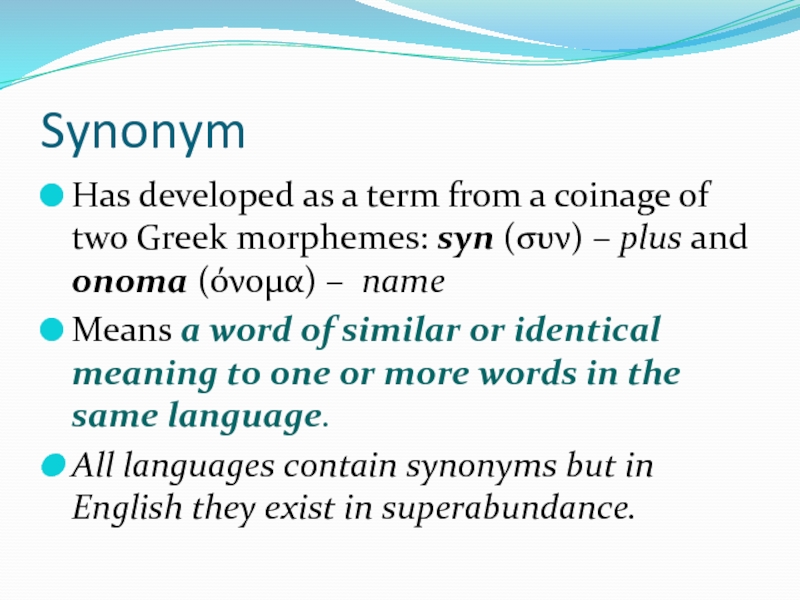
Слайд 3Synonymy
Is the coincidence in the essential meanings of identical
linguistic elements;
However, words with identical semantic elements preserve their differences
in connotations and stylistic characteristics (to be described below).
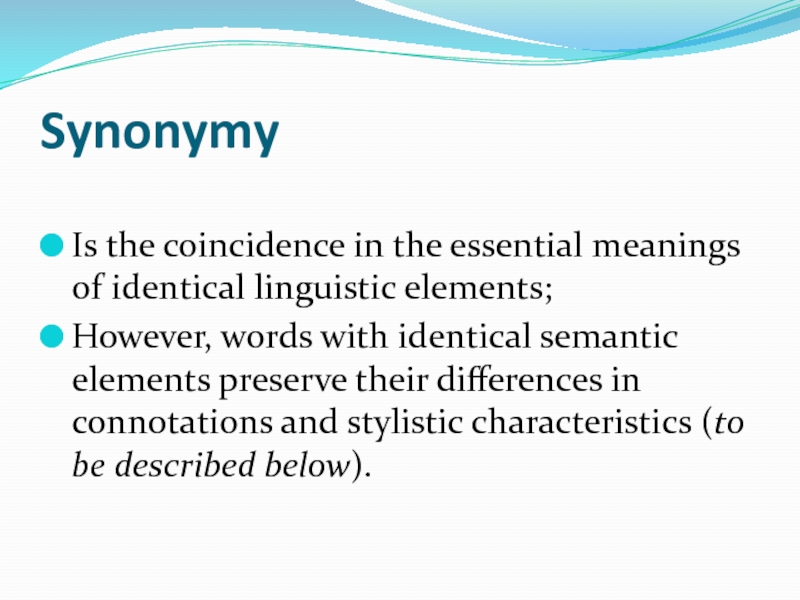
Слайд 4Synonyms: the Problem of Definition
In traditional linguistics synonyms are defined
on the basis of the notional criterion.
According to it
synonyms are words of the same category of parts of speech conveying the same notion, but differing either in shades of meaning or in stylistic characteristics (V.V. Vinogradov).

Слайд 5Synonyms: the Problem of Definition
The definition of synonyms based on
the semantic criterion runs as follows:
Lexical synonyms are different words
of the same part of speech which have some common denotational component(s) in their semantic structure, but differ either in some other denotational component(s) or in some connotational component(s) and thus usually have different lexical collocability (E.B. Cherkasskaya).
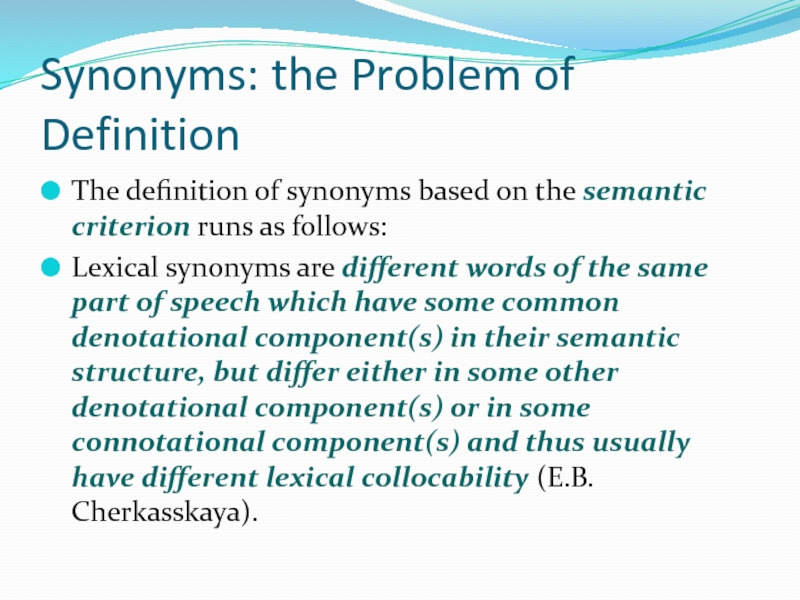
Слайд 6Synonyms: the Problem of Definition
In modern research on synonyms the
criterion of interchangeability is also applied.
According to it, synonyms
are defined as words which are interchangeable at least in some contexts without any considerable alteration in the denotational meaning.
The application of this criterion is however limited.
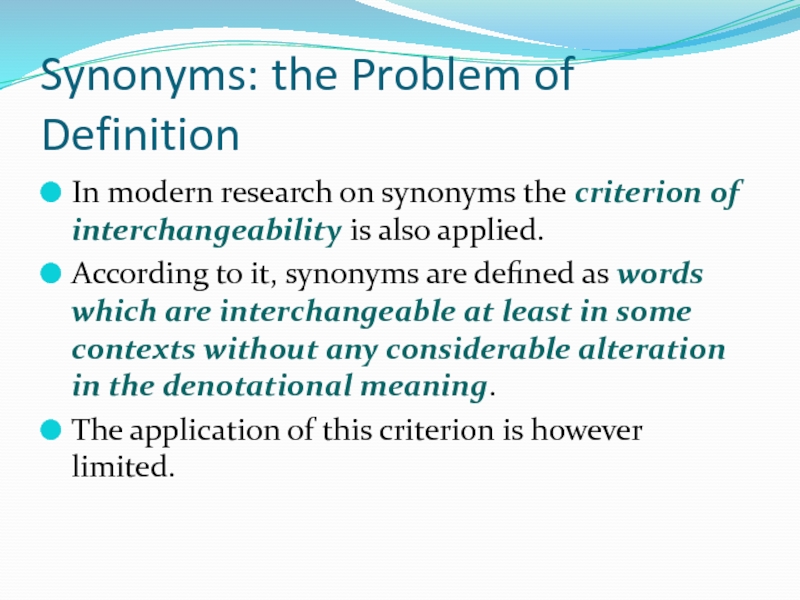
Слайд 7Synonyms: the Problem of Definition (summing up)
Synonyms can therefore be
defined in terms of linguistics as two or more words
of the same language,
belonging to the same part of speech and possessing one or more identical or nearly identical denotational meanings,
interchangeable, at least, in some contexts,
differing in morphemic composition, phonemic shape, connotations, affective value, style, valence and idiomatic use.
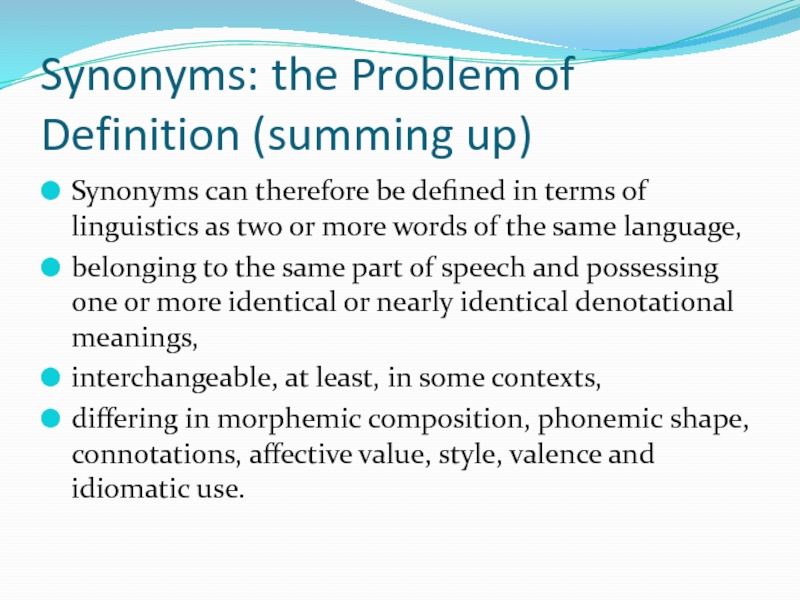
Слайд 8 Hope / expectation / anticipation
Denotational meaning (common): having something in
mind which is likely to happen.
Evaluative connotation: expectation may
be either of good or of evil, anticipation, as a rule, is a pleasurable expectation of something good, hope is not only a belief but a desire that some event would happen.
Stylistic difference: the Romance words anticipation and expectation are formal literary words used only by educated speakers, whereas the native monosyllabic hope is stylistically neutral.
Idiomatic usage: only hope is possible in such set expressions as: to hope against hope, to lose hope, to pin one’s hopes on smth, etc. Thus, neither expectation nor anticipation could be substituted into the following quotation from T. S. Eliot: You do not know what hope is until you have lost it.

Слайд 9How do Synonyms Appear in the Language?
Due to extensive borrowings
from other languages: city /French/ — town /native/; chair /French/
— stool /native/, etc.
Due to abbreviation (in most cases the abbreviated form belongs to the colloquial style, and the full form to the neutral style): examination – exam, laboratory – lab, etc.
Due to the appearance of euphemisms (words used to substitute in speech some unpleasant or offensive words): «the late» instead of «the dead», «to perspire» instead of «to sweat», etc.
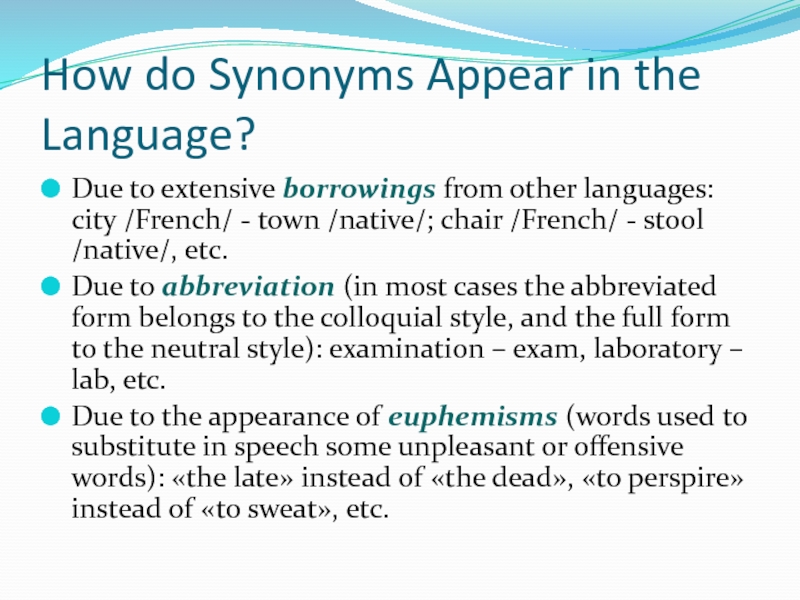
Слайд 10How do Synonyms Appear in the Language?
Due to the coexistence
and co-usage of words belonging to different dialects and language
varieties:
Boat (English) – coracle (Welsh)
Girl (English) – colleen (Irish)
Lift (BrEng) – elevator (AmEng)
Autumn (BrEng) – fall (AmEng), etc.

Слайд 11How do Synonyms Appear in the Language?
Due to the formation
of phrasal verbs, e.g. «to give up» — «to abandon»,
«to cut down» — «to diminish».
There are phraseological synonyms which are expressed by phrases similar semantically but different from the point of their pragmatics:
We say «to be late (for a lecture)» but «to miss (the train)».
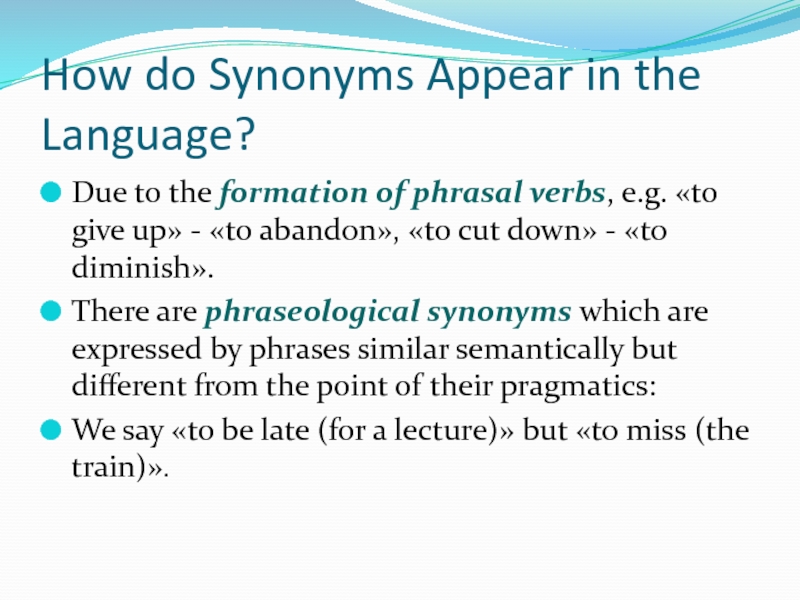
Слайд 12Groups of Synonyms
Synonyms enter groups, which are referred to as
synonymic sets.
Each synonymic set has a word which expresses
the most general idea and holds a commanding position over other words, it is called the synonymic dominant:
See, view, behold, perceive, etc.
Main, chief, crucial, critical, essential, etc.
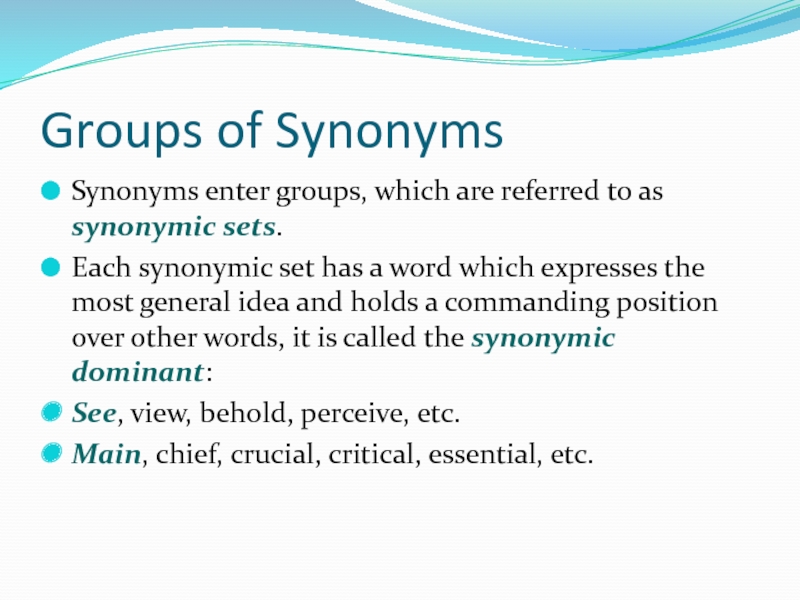
Слайд 13Functions of Synonyms
Synonyms have three main functions in speech:
the
function of substitution;
the function of precision of meaning;
the
expressive or stylistic function.
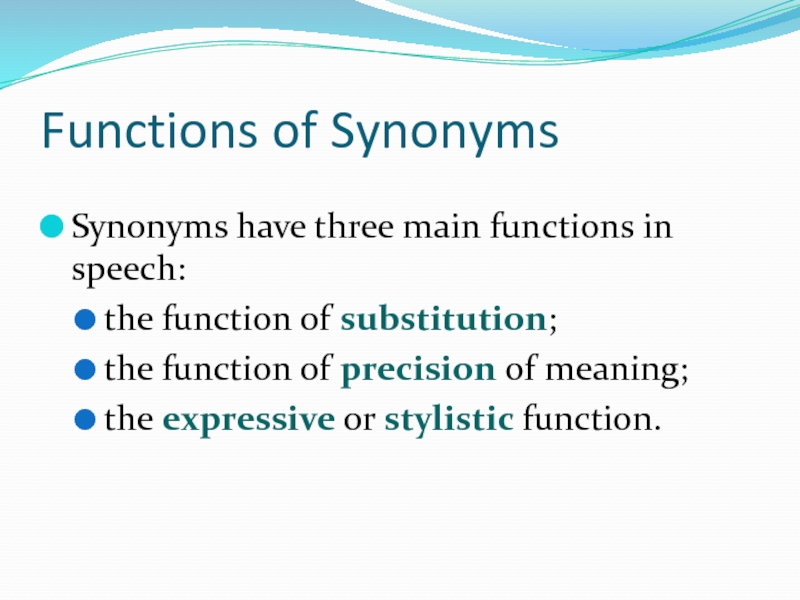
Слайд 14Classification of Synonyms
Absolute
Ideographic
Stylistic
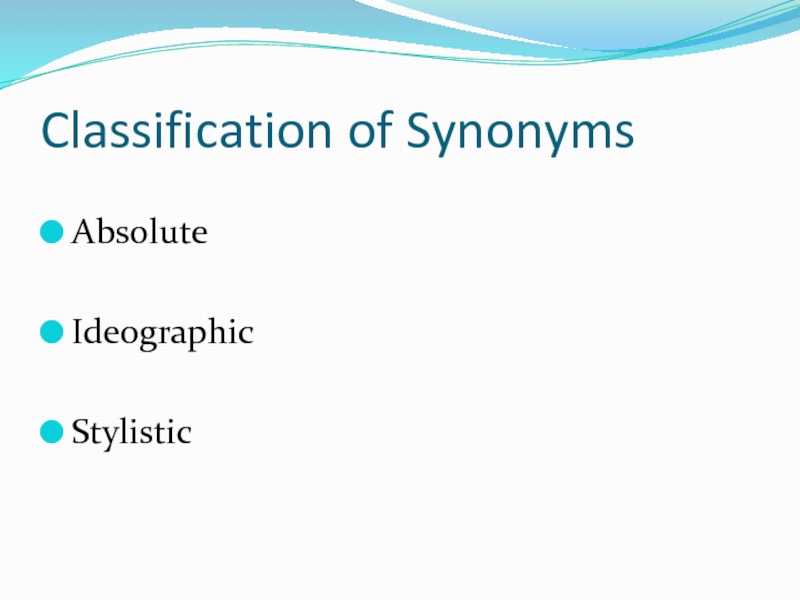
Слайд 15Absolute Synonyms
Words totally identical in their inner aspect (the denotational
meaning, connotations, emotive and stylistic charge);
They can replace each other
in any given context without the slightest alteration in the denotational or emotional meaning and connotations;
They are a rare occasion and are found mostly in terminology or among special words: noun and substantive, functional affix, flection and inflection).

Слайд 16Ideographic Synonyms
Words bearing the same idea but not being identical
in their referential content:
to ascent – to mount – to
climb
to happen – to occur – to befall – to chance
look – appearance – complexion – countenance, etc.

Слайд 17Stylistic Synonyms
are distinguished stylistically, i.e. in all kinds of emotional,
expressive and evaluative overtones without explicitly displaying semantic difference:
child (neutral)
– infant (elevated) – kid (colloquial)
die (neutral) – pass away (elevated) – kick the bucket (colloquial)
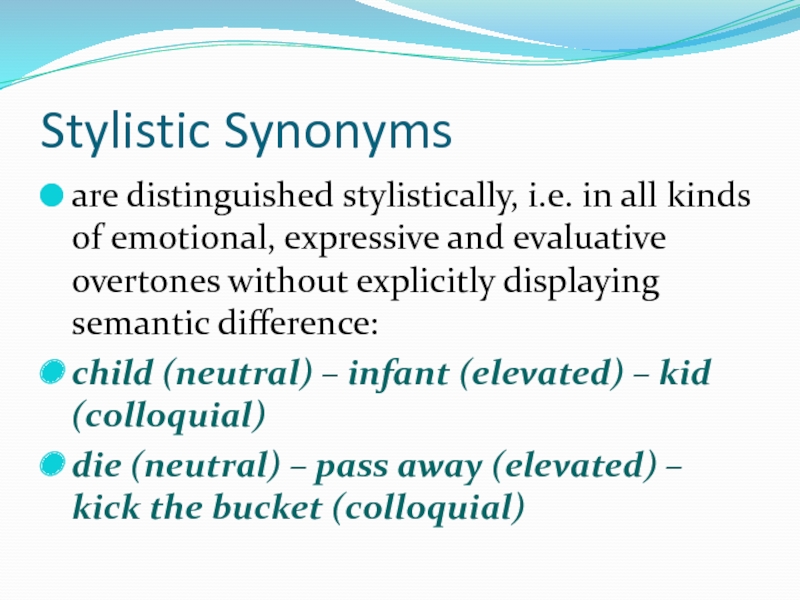
Слайд 18Other Types of Synonyms
Contextual Synonyms
Context can emphasize certain semantic
traits & suppress other semantic traits of words; thus words
with different meaning can become synonyms in a certain context: tasteless – dull, active – curious, curious – responsive, etc.
Referential Synonyms
a vague term, which concerns co-referential expressions, when one denotatum can be defined differently from different points of view and in different aspects: e.g. names Walter Scott and the author of ‘Ivanhoe’ are co-referential because they refer to one and the same denotatum – Sir Walter Scott;
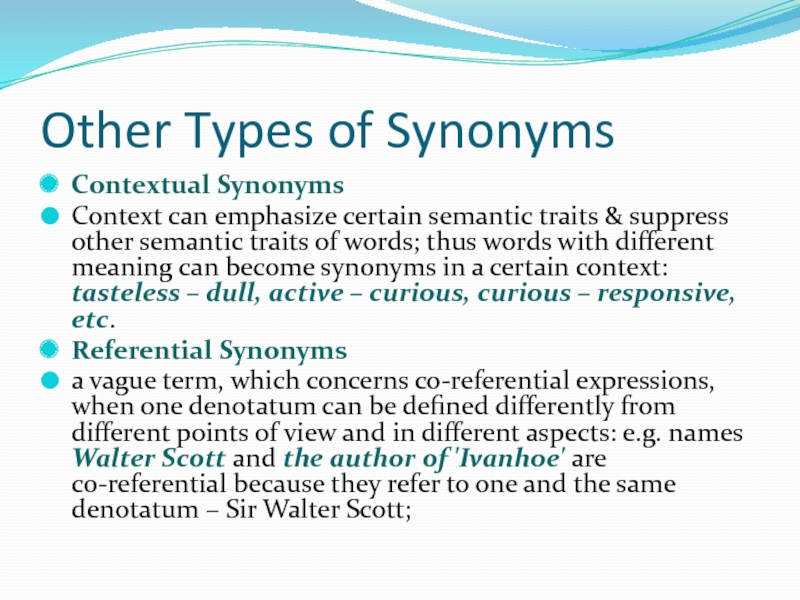
Слайд 19Synonymic condensation
Is typical of the English language and refers to
situations when writers or speakers bring together several words with
one & the same meaning to add more conviction or to make the description more vivid:
Safe & sound
Lord & master
First & foremost
Safe & secure
Stress & strain
By force & violence
It is deeply rooted in the history of English language since it was customary to use French borrowings together with their native synonyms, especially those which are characterized by alliteration and rhymes.
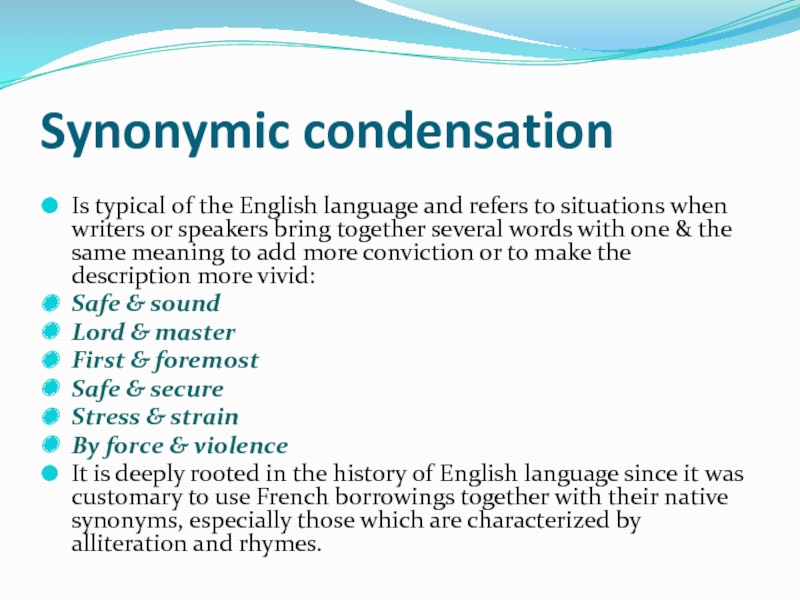
Слайд 20Antonyms
Words of the same part of speech which are opposite
in meaning.
Not every word of a language may have
an antonym though practically every word may have a synonym.
As is with synonyms, different lexical-semantic variants of a word have different antonyms:
Light – dark, light – heavy;
Bright – dim, bright – unintelligent, etc.

Слайд 21Antonyms: to the Problem of Definition
Antonyms may be defined as
two or more words of the same part of speech
which have some common denotational components in their semantic structure, but express some contrary or contradictory (contrasting) notions;
They are characterized by different types of semantic contrast of the denotational meaning and interchangeability at least in some contexts.
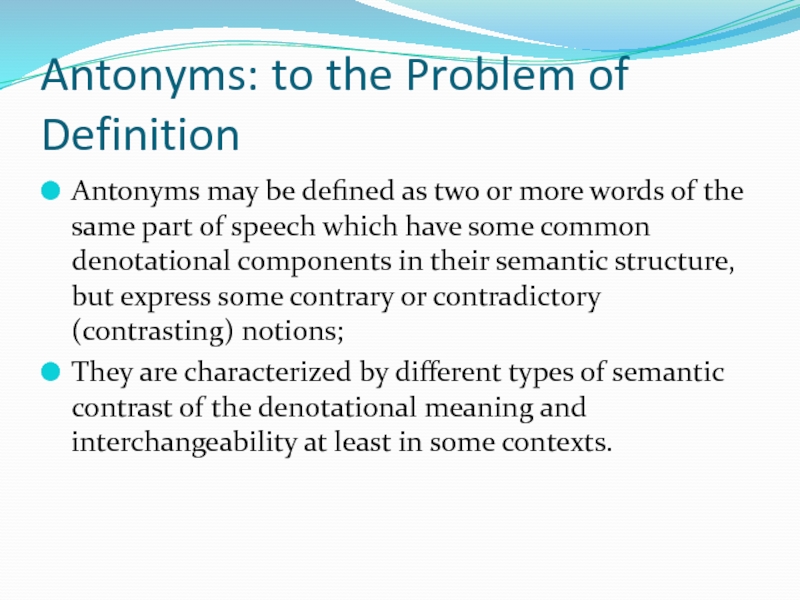
Слайд 22Types of Antonyms
According to the relationship between the notions expressed
antonyms are divided into
contradictories (intelligent – stupid, peaceful –
stormy, etc.) and
contraries (up – down, give – take, etc.).
According to their morphological structure antonyms may be subdivided into
root antonyms (intelligent — stupid) and
derivational antonyms (intelligent — unintelligent).

1. Synonyms
Lecture 9
2. The plan of the lecture
1) The definition of synonyms and the main
features
2) A synonymic dominant
3) Criteria of synonymy
4) Types of synonyms by V.V. Vinogradov
5) Some connotation types
6) Euphemisms
3. The definition of synonyms
• Synonymy is the coincidence in the essential meaning
of words which usually preserve their differences in
connotations and stylistic characteristics.
• Synonyms are two or more words belonging to the
same part of speech and possessing one or more
identical or nearly identical denotational meanings,
interchangeable in some contexts.
4. FAQ
What is denotation a connotation of a word ?
5. Examples
I have always liked you very much, I admire you
talent , but forgive me I could never love you as a
wife should love her husband.
-Was she a pretty girl?
-I would certainly have called her attractive.
……Romeo should smile, not grin
A young man was strolling along the street and his
small companion was demurely trotting by his side
6. Where is a dominant synonym?
To tremble – to shiver-to shudder-to
shake
7. Characteristic features of a dominant synonym
High frequency of usage
Broad combinability
Broad general meaning
Lack of connotations
8. Criteria of synonyms
Conceptional criterion
Semantic criterion
Criterion of interchangeability (much criticized)
9. Examples
He glared at her — ( angrily)
He gazed at her — (attentively, with
admiration)
He glanced at her — (briefly, with no
interest)
He peered at her — (through darkness,
fog)
10. Types of synonyms by V.V. Vinogradov
• Ideographic synonyms
• Stylistic synonyms
• Absolute synonyms
11. Classification
Ideographic synonyms
• Ideographic synonyms denote different shades of
meaning or different degrees of a given quality.
• They are nearly identical in one or more denotational
meanings and interchangeable at least in some
contexts,
• e.g. beautiful — fine — handsome -pretty Beautiful
conveys, for instance, the strongest meaning; it marks
the possession of that quality in its fullest extent, while
the other terms denote the possession of it in part only
12. Classification
Stylistic synonyms
• Stylistic synonyms differ not so much in denotational
as in emotive value or stylistic sphere of application.
• In many cases a stylistic synonym has an element of
elevation in its meaning,
• e.g. face — visage, girl — maiden.
• Along with elevation of meaning there is the reverse
process of degradation: to begin — to fire away, to eat
— to devour (пожирать) , to steal — to pinch, face –
muzzle (морда, рыло)
13. Classification
Absolute
• Total synonyms are those members of a synonymic
group which can replace each other in any given
context, without the slightest alteration in
denotative meaning or emotional meaning and
connotations.
• e.g. fatherland — motherland, noun — substantive,
functional affix — flection, inflection, scarlet fever
— scarlatina
14. Types of connotation
• Connotation of degree or intensity: to surprise – to
astonish – to amaze – to astound; to satisfy – to
please – to content – to delight.
• Duration connotation: to stare – to glare – to glance
– to peep.
Emotive connotation :;to love – to admire – to above
– to worship
Alone-single-lonely- solitary
15. Types of connotation
• Evaluative connotation: well known – famous –
notorious – covered – celebrated.
• Causative connotation: to sparkle (positive cause) – to
glitter (negative cause)
• The connotation of manner: to stroll – to stride – to
passé – to stagger – to stumble.
• The connotation of attendant circumstances to peepto peer
• Stylistic connotation snake-bite-refreshment-feast
• To leave-to be off-to clear out-to hoof it-to take the
air-to withdraw (formal)
16. Euphemisms
Lavatory – euphemisms (powder room,
washroom, restroom, ladies room, water-closet )
To eat – euphemisms (refresh yourself, break
bread )
Adj drunk – euphemisms (intoxicated (form),
under the influence, tipsy , fresh, merry, full, drunk
as a lord, drunk as an owl, boiled, fried, tanked,
high as a kite, half seas-over
Devil – euphemisms the Prince of Darkness, the
black one, deuce,Old Nick
17. Euphemisms
God- euphemisms Good Lord, By Heavens! My
goodness, Gracious me!
To die — euphemisms to pass away, to depart
Slang variants – to check out, to kick off, to kick
the bucket , to take a ride, to hop the twig, to join
the majority
























